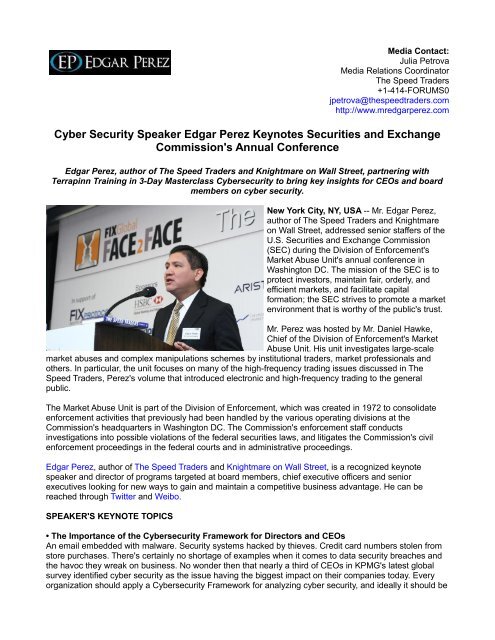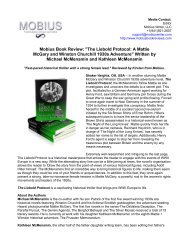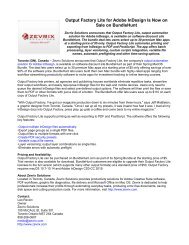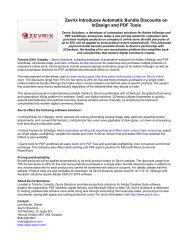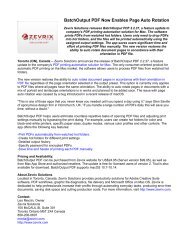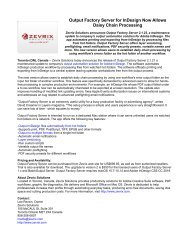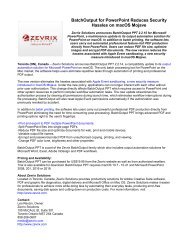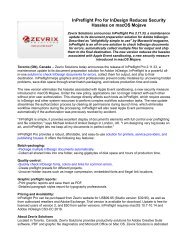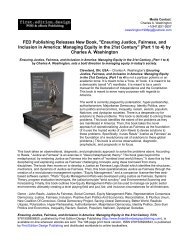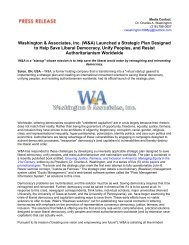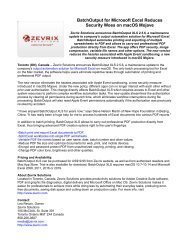Cyber Security Speaker Edgar Perez Keynotes Securities and Exchange Commission's Annual Conference
Edgar Perez, author of The Speed Traders and Knightmare on Wall Street, partnering with Terrapinn Training in 3-Day Masterclass Cybersecurity to bring key insights for CEOs and board members on cyber security.
Edgar Perez, author of The Speed Traders and Knightmare on Wall Street, partnering with Terrapinn Training in 3-Day Masterclass Cybersecurity to bring key insights for CEOs and board members on cyber security.
- TAGS
- staronepr
Create successful ePaper yourself
Turn your PDF publications into a flip-book with our unique Google optimized e-Paper software.
Media Contact:<br />
Julia Petrova<br />
Media Relations Coordinator<br />
The Speed Traders<br />
+1-414-FORUMS0<br />
jpetrova@thespeedtraders.com<br />
http://www.mredgarperez.com<br />
<strong>Cyber</strong> <strong>Security</strong> <strong>Speaker</strong> <strong>Edgar</strong> <strong>Perez</strong> <strong>Keynotes</strong> <strong>Securities</strong> <strong>and</strong> <strong>Exchange</strong><br />
<strong>Commission's</strong> <strong>Annual</strong> <strong>Conference</strong><br />
<strong>Edgar</strong> <strong>Perez</strong>, author of The Speed Traders <strong>and</strong> Knightmare on Wall Street, partnering with<br />
Terrapinn Training in 3-Day Masterclass <strong>Cyber</strong>security to bring key insights for CEOs <strong>and</strong> board<br />
members on cyber security.<br />
New York City, NY, USA -- Mr. <strong>Edgar</strong> <strong>Perez</strong>,<br />
author of The Speed Traders <strong>and</strong> Knightmare<br />
on Wall Street, addressed senior staffers of the<br />
U.S. <strong>Securities</strong> <strong>and</strong> <strong>Exchange</strong> Commission<br />
(SEC) during the Division of Enforcement's<br />
Market Abuse Unit's annual conference in<br />
Washington DC. The mission of the SEC is to<br />
protect investors, maintain fair, orderly, <strong>and</strong><br />
efficient markets, <strong>and</strong> facilitate capital<br />
formation; the SEC strives to promote a market<br />
environment that is worthy of the public's trust.<br />
Mr. <strong>Perez</strong> was hosted by Mr. Daniel Hawke,<br />
Chief of the Division of Enforcement's Market<br />
Abuse Unit. His unit investigates large-scale<br />
market abuses <strong>and</strong> complex manipulations schemes by institutional traders, market professionals <strong>and</strong><br />
others. In particular, the unit focuses on many of the high-frequency trading issues discussed in The<br />
Speed Traders, <strong>Perez</strong>'s volume that introduced electronic <strong>and</strong> high-frequency trading to the general<br />
public.<br />
The Market Abuse Unit is part of the Division of Enforcement, which was created in 1972 to consolidate<br />
enforcement activities that previously had been h<strong>and</strong>led by the various operating divisions at the<br />
<strong>Commission's</strong> headquarters in Washington DC. The <strong>Commission's</strong> enforcement staff conducts<br />
investigations into possible violations of the federal securities laws, <strong>and</strong> litigates the <strong>Commission's</strong> civil<br />
enforcement proceedings in the federal courts <strong>and</strong> in administrative proceedings.<br />
<strong>Edgar</strong> <strong>Perez</strong>, author of The Speed Traders <strong>and</strong> Knightmare on Wall Street, is a recognized keynote<br />
speaker <strong>and</strong> director of programs targeted at board members, chief executive officers <strong>and</strong> senior<br />
executives looking for new ways to gain <strong>and</strong> maintain a competitive business advantage. He can be<br />
reached through Twitter <strong>and</strong> Weibo.<br />
SPEAKER'S KEYNOTE TOPICS<br />
• The Importance of the <strong>Cyber</strong>security Framework for Directors <strong>and</strong> CEOs<br />
An email embedded with malware. <strong>Security</strong> systems hacked by thieves. Credit card numbers stolen from<br />
store purchases. There's certainly no shortage of examples when it comes to data security breaches <strong>and</strong><br />
the havoc they wreak on business. No wonder then that nearly a third of CEOs in KPMG's latest global<br />
survey identified cyber security as the issue having the biggest impact on their companies today. Every<br />
organization should apply a <strong>Cyber</strong>security Framework for analyzing cyber security, <strong>and</strong> ideally it should be
integrated into an organization's existing enterprise risk framework. The key is making it part of the<br />
mainstream of risk management within an organization. The most innovative companies today have<br />
recognized that cyber security is a customer experience <strong>and</strong> revenue opportunity, not just a risk that<br />
needs to be managed. Mr. <strong>Perez</strong> will explain why this must done across the entire organization <strong>and</strong> why<br />
the CEO <strong>and</strong> Board of Directors have the most important role to play.<br />
• The Impact of Brexit in the U.K <strong>and</strong> the World<br />
Companies inside <strong>and</strong> outside Britain's borders have warned that the Brexit decision is affecting their<br />
businesses, highlighting how the June vote for the UK to leave the European Union is having wide<br />
repercussions. The vote roiled equity markets worldwide <strong>and</strong> led to a devaluation of sterling amid<br />
concerns over a prolonged slowdown in consumer dem<strong>and</strong>. The U.K.'s decision to leave the European<br />
Union inflicted an immediate blow on the economy as business activity shrank at its fastest pace since the<br />
last recession seven years ago. The International Monetary Fund said that it had become less optimistic<br />
on global growth, <strong>and</strong> warned the damage could worsen if confidence falters among investors <strong>and</strong><br />
companies, as fears abound over businesses <strong>and</strong> customers reining in spending during a period of<br />
uncertainty for the UK as it negotiates the terms of its exit. Mr. <strong>Perez</strong> will identify the world economies that<br />
will feel the lion's share of the short <strong>and</strong> long-term pain to come.<br />
• Blockchain <strong>and</strong> its impact on Finance<br />
Blockchain technology (the software behind the digital currency, Bitcoin) offers an opportunity to overhaul<br />
existing business models, including banking infrastructure, approach to settlements <strong>and</strong> customer<br />
interactions. Now it is only a matter of time before the broader financial services <strong>and</strong> banking industries<br />
shift to blockchain <strong>and</strong> network-based approaches. The application possibilities are endless, improving the<br />
way we hold <strong>and</strong> transfer secure goods from money to deeds to music to intellectual property. In fact,<br />
blockchain, as a pure platform technology, may be able to cut out the middlemen (or middle companies)<br />
everywhere, even disrupting other disruptors like Airbnb or Uber. Mr. <strong>Perez</strong> will explain why the question is<br />
not whether network business models supported by blockchain technology will disrupt organizations, but<br />
when.<br />
• The Biggest Risks for Financial Markets<br />
Constant regulatory changes <strong>and</strong> technological evolution have transformed the financial l<strong>and</strong>scape so<br />
profoundly since the advent of the first electronic networks in the early 1970s. Regulators around the world<br />
are now in a race to respond to the evolution of technology in financial markets <strong>and</strong> prevent its operational<br />
challenges from becoming the biggest risk for financial markets. However, when considering technology<br />
<strong>and</strong> the cyber l<strong>and</strong>scape, errors are bound to happen. Financial services firms are expected to have<br />
deployed the most sophisticated defense systems against cyberattacks. Trading firms are expected to<br />
have controls in place <strong>and</strong> invest in the technology to keep up to date. Most companies would realize the<br />
need of these investments <strong>and</strong> honestly attempt to implement them, but their IT departments would soon<br />
hit a wall, because of direct involvement from senior management <strong>and</strong> boards of directors. Compliance<br />
actions against those who missed their importance will go a long way toward restoring investor confidence<br />
<strong>and</strong> limiting the impact of the biggest risk for financial markets.<br />
• Finance in the New Global Economy<br />
Until quite recently, globalization was seen as a one-way street. Multinationals, which led the charge four<br />
decades or so ago into growing global markets, were its ambassadors, <strong>and</strong> American <strong>and</strong> European<br />
workers, whose wages <strong>and</strong> upward mobility were flattened, were feeling left out. The core idea was that<br />
globalization, technological innovation <strong>and</strong> unfettered free trade would erase historical <strong>and</strong> geographic<br />
boundaries, making the world ever more economically interconnected <strong>and</strong> alike. Developed economies<br />
would come under more <strong>and</strong> more competitive pressure from eager upstart nations. Now we are entering<br />
a new age of volatility. Financiers will become less important, manufacturers more so. Blue collar jobs will<br />
go high tech. Robots will replace Chinese workers. Mr. <strong>Perez</strong> will discuss why finance st<strong>and</strong>s now in front<br />
of its biggest transformation triggered not by any of the financial conglomerates that dominate the world<br />
today but by obscure startups that could be working already in garages in Silicon Valley, Shanghai, Kiev or<br />
Delhi.
• China: To Rebalance or Not to Rebalance<br />
China's 12th Five-Year Guideline in 2011 included efforts to rebalance its economy, shifting emphasis from<br />
investment towards consumption <strong>and</strong> development from urban <strong>and</strong> coastal areas toward rural <strong>and</strong> inl<strong>and</strong><br />
areas. Flash forward to 2016 <strong>and</strong> the country is exhibiting massive overcapacity in sectors linked to real<br />
estate, steel, cement, coal <strong>and</strong> construction equipment, zombie businesses continue to undermine the<br />
sustainability of China's growth <strong>and</strong> exports are declining. At 260% of gross domestic product, the<br />
country's overall debt is approaching danger levels. The world's second-largest economy is now posting<br />
its weakest annual growth in 25 years, 6.9% for 2015. To top it all, $676 billion left China in 2015; with so<br />
much overcapacity in China, lack of confidence in the future as monetary policy can change tomorrow,<br />
why should people keep money inside China? Why should we bet on China? Mr. <strong>Perez</strong> will bring the<br />
answers you are looking for.<br />
• Social Engineering: The "Weakest Human Link" in <strong>Cyber</strong>security<br />
Social engineering involves tricking your employees into breaching security protocols or giving away<br />
information, most often over the telephone or via email. Social engineering exploits human weaknesses<br />
rather than technology, preying upon people's propensity towards trust in particular. Often, these exploits<br />
are used to gather information to support a more targeted cyberattack, with the initial forays based on the<br />
premise of 'little <strong>and</strong> often' so as not to cause concern. Employees at all levels, including senior<br />
executives, are vulnerable. Mr. <strong>Perez</strong> will explain why by improving employee awareness <strong>and</strong> introducing<br />
simple technical measures, organizations can protect themselves against social engineering techniques<br />
<strong>and</strong> the risk of a cyberattack <strong>and</strong> its potential impact on business, customers <strong>and</strong> data.<br />
• Establishing or Improving a <strong>Cyber</strong>security Program<br />
The NIST <strong>Cyber</strong>security Framework, which was drafted by the Commerce Department's National Institute<br />
of St<strong>and</strong>ards <strong>and</strong> Technology (NIST), comprises leading practices from various st<strong>and</strong>ards bodies that<br />
have proved to be successful when implemented, <strong>and</strong> it also may deliver regulatory <strong>and</strong> legal advantages<br />
that extend well beyond improved cybersecurity for organizations that adopt it early. Its adoption may<br />
prove advantageous for businesses across virtually all industries. Mr. <strong>Perez</strong> will explain why a proper<br />
<strong>Cyber</strong>security Program will build on the analysis of the possible areas of concern, an underst<strong>and</strong>ing of the<br />
company's most critical assets, <strong>and</strong> a thorough review of Information Technology's policies <strong>and</strong><br />
procedures when faced with cybercrime.<br />
• The Present <strong>and</strong> Future of High-Frequency Trading<br />
On May 6, 2010, the Dow Jones Industrial Average plummeted nearly 1,000 points, then its biggest<br />
intraday point drop ever. The "Flash Crash" revealed the influence of high-frequency trading to<br />
mainstream audiences around the world. In fact, over the past 15 years, the global financial market has<br />
fragmented: where there were once three main U.S. exchanges, there are now more than 40 exchanges<br />
<strong>and</strong> alternative trading systems. High-frequency trading companies have largely replaced traditional<br />
broker-dealers, using algorithms instead of human traders to make decisions in milliseconds, mostly in<br />
response to orders made by other algorithms. Mr. <strong>Perez</strong> will discuss the benefits brought by technology,<br />
making trading faster <strong>and</strong> more efficient, as well as the potential costs brought upon institutional <strong>and</strong> retail<br />
investors.<br />
ABOUT EDGAR PEREZ<br />
Mr. <strong>Edgar</strong> <strong>Perez</strong> is a published author, business consultant for billion-dollar private equity <strong>and</strong> hedge funds<br />
<strong>and</strong> Council Member at the Gerson Lehrman Group, Guidepoint Global Advisors <strong>and</strong> Research<br />
International, with subject matter expertise in cyber security, investing, trading, financial regulation (Dodd-<br />
Frank Act) <strong>and</strong> market structure.<br />
He is author of Knightmare on Wall Street, The Rise <strong>and</strong> Fall of Knight Capital <strong>and</strong> the Biggest Risk for<br />
Financial Markets (2013), <strong>and</strong> The Speed Traders, An Insider's Look at the New High-Frequency Trading<br />
Phenomenon That is Transforming the Investing World, published in English by McGraw-Hill Inc. (2011),<br />
Published in M<strong>and</strong>arin by China Financial Publishing House (2012), <strong>and</strong> Investasi Super Kilat, published<br />
in Bahasa Indonesia by Kompas Gramedia (2012).
Mr. <strong>Perez</strong> is course director of <strong>Cyber</strong>security Boardroom Workshop, How Boards of Directors <strong>and</strong> CXOs<br />
Can Build the Proper Foundation to Address Today's Information <strong>Security</strong> Challenges, <strong>and</strong> The Speed<br />
Traders Workshop, How High Frequency Traders Leverage Profitable Strategies to Find Alpha in Equities,<br />
Options, Futures <strong>and</strong> FX; he has presented his workshops in Singapore, Hong Kong, Sao Paulo, Seoul,<br />
Kuala Lumpur, Warsaw, Kiev, New York, Singapore, Beijing, Shanghai. He contributes to The New York<br />
Times <strong>and</strong> China's International Finance News <strong>and</strong> Sina Finance.<br />
Mr. <strong>Perez</strong> has presented to the Council on Foreign Relations, Vadym Hetman Kyiv National Economic<br />
University (Kiev), Quant Investment & HFT Summit APAC (Shanghai), U.S. <strong>Securities</strong> <strong>and</strong> <strong>Exchange</strong><br />
Commission (Washington DC), CFA Singapore, Hong Kong <strong>Securities</strong> Institute, Courant Institute of<br />
Mathematical Sciences at New York University, University of International Business <strong>and</strong> Economics<br />
(Beijing), Hult International Business School (Shanghai) <strong>and</strong> Pace University (New York), among other<br />
public <strong>and</strong> private institutions. In addition, Mr. <strong>Perez</strong> has spoken at a number of global conferences,<br />
including <strong>Cyber</strong> <strong>Security</strong> World <strong>Conference</strong> (New York), Inside Market Data (Chicago), Emerging Markets<br />
Investments Summit (Warsaw), CME Group's Global Financial Leadership <strong>Conference</strong> (Naples Beach,<br />
FL), Harvard Business School's Venture Capital & Private Equity <strong>Conference</strong> (Boston), High-Frequency<br />
Trading Leaders Forum (New York, Chicago), MIT Sloan Investment Management <strong>Conference</strong><br />
(Cambridge), Institutional Investor's Global Growth Markets Forum (London), Technical Analysis Society<br />
(Singapore), TradeTech Asia (Singapore), FIXGlobal Face2Face (Seoul) <strong>and</strong> Private Equity Convention<br />
Russia, CIS & Eurasia (London).<br />
Mr. <strong>Perez</strong> has been interviewed on CNN's Quest Means Business, CNBC's Squawk on the Street,<br />
Worldwide <strong>Exchange</strong>, Cash Flow <strong>and</strong> Squawk Box, FOX BUSINESS's Countdown to the Closing Bell <strong>and</strong><br />
After the Bell, Bloomberg TV's Market Makers, CNN en Español's Dinero, Petersburg - Channel 5, Sina<br />
Finance, BNN's Business Day, CCTV China, Bankier.pl, TheStreet.com, Leaderonomics, GPW Media,<br />
Channel NewsAsia's Business Tonight <strong>and</strong> Cents & Sensibilities. In addition, Mr. <strong>Perez</strong> has been featured<br />
on Sohu, News.Sina.com, Yicai, eastmoney, Caijing, ETF88.com, 360doc, AH Radio, CNFOL.com,<br />
CITICS Futures, Tongxin <strong>Securities</strong>, ZhiCheng.com, CBNweek.com, Caixin, Futures Daily, Xinhua, CBN<br />
Newswire, Chinese Financial News, ifeng.com, International Finance News, Finance.QQ.com, hexun.com,<br />
Finance.Sina.com, The Korea Times, The Korea Herald, The Star, The Malaysian Insider, BMF 89.9,<br />
iMoney Hong Kong, CNBC, Bloomberg Hedge Fund Brief, The Wall Street Journal, The New York Times,<br />
Dallas Morning News, Valor Econômico, FIXGlobal Trading, TODAY Online, Oriental Daily News <strong>and</strong><br />
Business Times.<br />
Mr. <strong>Perez</strong> was a vice president at Citigroup, a senior consultant at IBM, <strong>and</strong> a strategy consultant at<br />
McKinsey & Co. in New York City. Previously, he managed Operations <strong>and</strong> Technology for Peruval<br />
Finance. Mr. <strong>Perez</strong> has an undergraduate degree in Systems Engineering from Universidad Nacional de<br />
Ingeniería, Lima, Peru (1994), a Master of Administration from Universidad ESAN, Lima, Peru (1997) <strong>and</strong><br />
a Master of Business Administration from Columbia Business School, New York, with a dual major in<br />
Finance <strong>and</strong> Management (2002). He belongs to the Beta Gamma Sigma honor society. Mr. <strong>Perez</strong> is an<br />
accomplished salsa <strong>and</strong> hustle dancer <strong>and</strong> resides in the New York City area.


